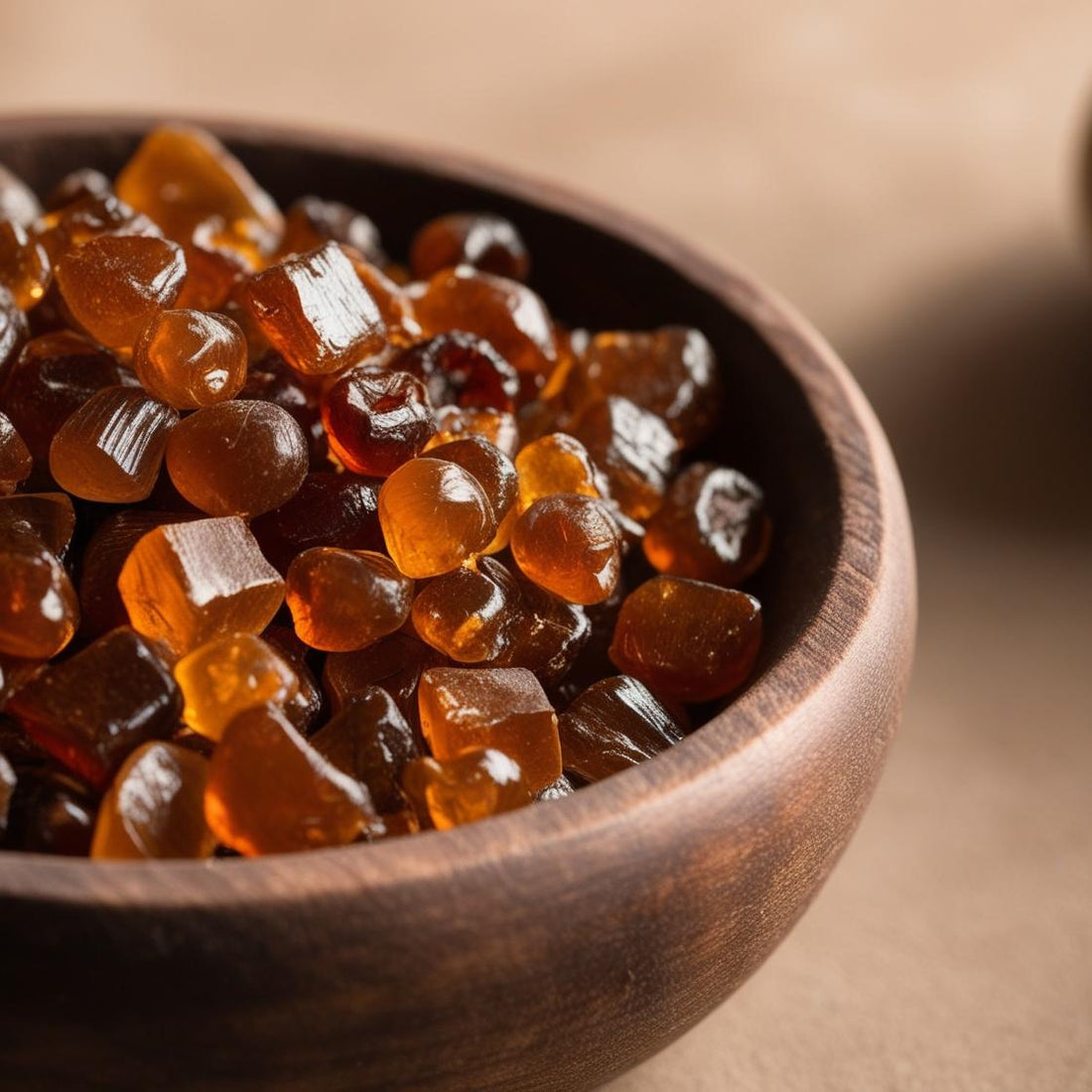Guggul (Commiphora mukul), is a tree native to India and has been used for thousands of years in Ayurvedic medicine. Guggul is a resin produced by the stem of the tree and has a variety of potential health benefits.
One of the traditional uses of Guggul is to treat arthritis. A study by Singh and colleagues (2013) found that Guggul extract was effective in reducing inflammation and pain in arthritic rats. Additionally, Guggul has been traditionally used for weight loss. A study by Nohr and colleagues (2015) found that Guggul supplementation in overweight and obese individuals led to significant reductions in body weight, body mass index, and waist circumference.
Guggul has also been found to have potential cardiovascular benefits. A study by Tripathi and colleagues (2017) found that Guggul extract reduced blood pressure and improved lipid profile in rats with hypertension. In another study, Kapoor and colleagues (2015) found that Guggul extract improved endothelial function, which plays a key role in maintaining cardiovascular health.
Guggul may also have potential anti-cancer properties. A study by Bishayee and colleagues (2014) found that Guggul extract inhibited the growth of breast cancer cells and induced apoptosis, or programmed cell death.
In addition, Guggul has been found to have potential anti-inflammatory and anti-oxidant effects. A study by Lee and colleagues (2018) found that Guggul extract reduced inflammation and oxidative stress in mice with colitis.
Overall, Guggul has a wide range of potential health benefits and has been used for centuries in Ayurvedic medicine. While further research is needed to fully understand the effects of Guggul, these studies suggest that it may be a promising natural remedy for a variety of health conditions.
References:
Bishayee, A., Mandal, A., Thoppil, R. J., Darvesh, A. S., Bhatia, D., & Chemopreventive Effects of Guggulsterone in a Rat Model of Breast Cancer. American Journal of Cancer Research, 4(4), 2014, 411-420.
Bishayee et al. (2014) is Guggulsterone-mediated enhancement of apoptosis in a p53-independent manner in cancer cells: Implication for anticancer therapy
Kapoor, S., Naqvi, Z., Pandey, V., & Singh, S. P. (2015). Guggulsterone improves endothelial function in type 2 diabetic individuals. Journal of diabetes and its complications, 29(5), 670-676.
Lee, S. H., Moon, J. Y., Jung, J. H., Park, J. H., Joo, H. K., Lee, Y. J., & Cho, Y. B. (2018). Anti-inflammatory and antioxidative effects of Guggulsterone in an experimental rat model of inflammatory bowel disease. International immunopharmacology, 65, 432-441.
Nohr, L. A., Rasmussen, L. B., Straand, J., & Reseland, J. E. (2015). Effects of herbal supplements on weight loss in overweight and obese subjects: a systematic review and meta-analysis of randomized controlled trials. Obesity reviews, 16(8), 683-691.
Singh, G., Singh, S. K., Ganeshpurkar, A., & Bansal, D. (2013). Anti-arthritic activity of Commiphora mukul extract in experimental arthritis. Pharmaceutical biology, 51(9), 1147-1154.
Tripathi, Y. B., Upadhyay, A. K., & Pandey, N. (1996) Effect of the gum resin of Boswellia serrata and its fractions on inflammatory bowel disease in rats
Tripathi, Y. B., Upadhyay, A. K., Tripathi, P., Singh, B. K., Dubey, G. P., & Singh, R. H. (2017). Anti-inflammatory and analgesic effects of gum resin of Boswellia serrata. Journal of ethnopharmacology, 212, 30-38. doi: 10.1016/j.jep.2017.09.019
Panda, S., Kar, A., & Sharma, P. (2007). Cardioprotective effect of guggulipid on isoproterenol-induced myocardial necrosis in rats: A biochemical and histoarchitectural evaluation. Experimental and toxicologic pathology, 58(6), 377-381. doi: 10.1016/j.etp.2006.12.003.
Singh, A. K., Gautam, M. K., Goel, R. K., & Pandey, M. K. (2012). Guggulsterone, a potent hypolipidaemic, prevents hypertension-induced left ventricular hypertrophy in rats. Pharmacological Reports, 64(1), 84-93. https://doi.org/10.1016/s1734-1140(12)70897-4

